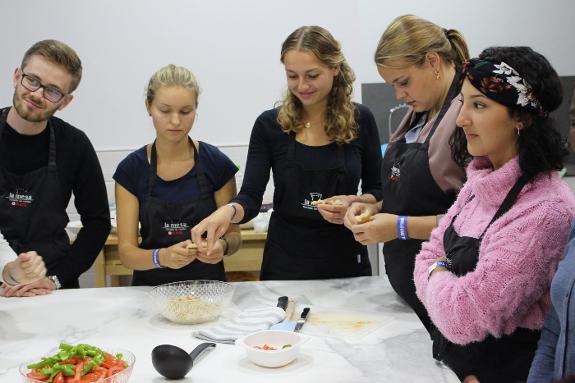A way of making food and friends
'Welcome to UMA' recently organised an Andalusian cookery workshop for students
PATRICIA PINEDA
Viernes, 29 de diciembre 2017, 17:27
It can come as a great shock to move to a country you don't know, and one which has a different culture, and it can sometimes also lead to loneliness. That was what the Department of Internationalisation team at Malaga university were thinking, when they set about finding a way of helping students to make friends. Together with the Welcome to UMA office, they recently came up with the idea of organising an Andalusian Cookery Workshop.
Those who attended this workshop were international students who had come to study at Malaga University, and who were mostly on their own. Through this workshop they not only learned to make typical Andalusian dishes, but also learned more about the culture of the region and, at the same time, met other people who, like them, are a long way from home.
The workshops and events of this type which are organised for international and Erasmus students are free of charge and are always a great success. On this occasion there was only room for 30 people to attend, but sources at the Welcome to UMA office say they received more than 300 applications.
The workshop was held at La Mesa Malaga, and the students were of many different nationalities, having come from countries such as Namibia, Germany, Slovakia, Czech Republic, Poland, France, Lithuania, Mexico, Italy, Belgium, the USA and South Korea.
The recipes they learned to make were 'porra antequerana', fried aubergines with molasses and potato omelette. These dishes were chosen because they are the simplest ones but at the same time are most typical of the gastronomy of Andalucía. Although many of the students found it rather difficult to turn their 'tortilla' over, the laughter this produced created links of friendship between them and that, of course was one of the objectives.
Two who were already friends, Ana and Maryam, signed up for the workshop to get to know more people and, especially, to learn to cook Spanish food. I wanted to learn to make local dishes, because I thought it would be a fun thing to do and also it has been a good way of meeting people, said Ana. It also helped that it was free. Other Spanish cookery courses cost money, added Maryam.
After cooking the dishes, the students were able to enjoy eating them and they were also given a book of the recipes so they can make them at home.
